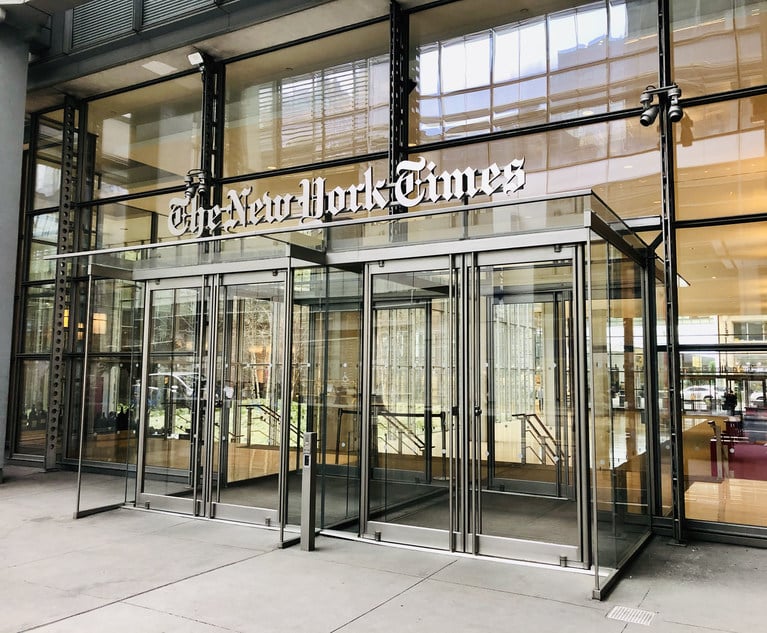New Yorker Magazine Email's Hyperlink to 2010 Article Wasn't Republication, Appeals Court Says in Defamation Case
An Appellate Division, First Department panel wrote that “the email sent by defendant to New Yorker magazine subscribers in April 2017 containing a hyperlink to an article published in the magazine in July 2010 does not constitute republication of the article.”
April 12, 2019 at 06:26 PM
5 minute read
 Credit: Shutterstock.com.
Credit: Shutterstock.com.
A 2017 New Yorker magazine email to subscribers circulating a story from 2010 that was the basis of a defamation lawsuit—in which four passages were deemed “susceptible to defamatory connotation” in one of numerous court rulings before the suit was dismissed—does not constitute a republication of the article for defamation purposes, a state appeals court has ruled.
In a terse opinion, an Appellate Division, First Department panel, which ultimately dismissed the newly filed defamation lawsuit on statute-of-limitation grounds, wrote that “the email sent by defendant to New Yorker magazine subscribers in April 2017 containing a hyperlink to an article published in the magazine in July 2010 does not constitute republication of the article.”
The unanimous panel pointed out that “the article was unmodified and had been continuously archived on the same website since the printed version was first published.”
“Moreover,” the panel wrote, “it is not alleged that the 2017 email … contained any defamatory statements about plaintiff.” The panel then stated that “a reference to an article that does not restate the defamatory material is not a republication of the material.”
The plaintiff in the original lawsuit and in the more recent republication lawsuit—which was filed in 2017 in state court—is Peter Paul Biro. He is a forensic scientist and art authenticator who has been described by Manhattan Supreme Court Justice Kathryn Freed in a lower court opinion as being “known in the art world for devising scientific methods of authenticating art through fingerprint analysis.”
In 2011, Biro first brought a libel and injurious falsehood action in the U.S. District Court for the Southern District of New York over the 2010 New Yorker article, which he has said included “large portions” of writing about and concerning him.
Both that lawsuit and his more recent 2017 defamation suit in Manhattan Supreme Court have named Conde Nast, a division of Advance Magazine Publishers Inc., as the central defendant. Conde Nast publishes The New Yorker.
The 16,000-word story in question, by David Grann, ran in the July 12-19, 2010, issue of The New Yorker and was titled, “The Mark of a Masterpiece: The man who keeps finding famous fingerprints on uncelebrated works of art.”
While the article does not open with discussing Biro, he becomes a central figure in the lengthy piece. And according to Freed's 2018 decision tossing out Biro's more recent defamation action, Biro had alleged in his 2011 lawsuit that “the article implied that he was a fraud who sells fake art and was incompetent at art authentication.”
In that 2011-filed action, there were numerous federal court rulings, according to Biro's 2017 complaint in state court.
Among those rulings, said Biro, were six District Court opinions and two U.S. Court of Appeals for the Second Circuit opinions.
Ultimately, the District Court dismissed the 2011-filed lawsuit, and the Second Circuit affirmed that dismissal.
But earlier in the federal litigation, the District Court ruled at one point, according to Biro and to Freed in her state court opinion, that four passages in Grann's article were susceptible to defamatory connotation.
In April 2017, The New Yorker sent out to its many subscribers an email that, according to Biro's complaint, was headed “THE NEW YORKER SUNDAY/A selection of stories from the New Yorker's archive/The World of David Grann.” It included hyperlinks to six different Grann New Yorker stories.
The email allegedly celebrated Grann's work and part of it said to readers, “so go ahead and binge-read Grann's work.”
In his 2017 state court complaint, Biro alleged that “both the original and republished Articles have been widely circulated, and have caused, and continue to cause, damage to plaintiff's reputation, to his business and to his health.”
But the First Department panel, in affirming Freed's 2018 dismissal of the state lawsuit as being barred by the statute of limitations, ruled that “a reference to an article that does not restate the defamatory material is not a republication of the material,” citing Klein v. Biben.
The panel then ruled in the April 4 decision that “his action is therefore barred by the one-year statute of limitations for defamation claims … which generally accrues on the date of the first publication.” The panel was comprised of Justices John Sweeny, Sallie Manzanet-Daniels, Cynthia Kern, Jeffrey Oing and Anil Singh.
Richard Altman of the Law Office of Richard A. Altman has represented Biro in both the original federal litigation and the state case.
Reached by phone Friday, he said that he respectfully disagreed with the First Department panel's decision. He also noted that he and his client intend to seek leave to appeal.
“There are many defamation cases that arise out of republished material,” he said, “and what they basically say is that the context of the republication is crucial.”
“When you have a context like you have here, where the original material is brought to the attention to a new audience, and you're trying to get people to read something they did not read before, then it's republished and the statute of limitations begins anew,” he said.
But David Schulz, a Ballard Spahr senior counsel who has represented Conde Nast in both litigations, said by phone Friday that the First Department's decision “is clear, and is consistent with precedent, and is obviously right.”
“All that The New Yorker did was reference an earlier article and provide a link to it, which people do everyday on the internet,” Schulz said. ”If Mr. Altman were correct, the internet would grind to a halt.”
This content has been archived. It is available through our partners, LexisNexis® and Bloomberg Law.
To view this content, please continue to their sites.
Not a Lexis Subscriber?
Subscribe Now
Not a Bloomberg Law Subscriber?
Subscribe Now
NOT FOR REPRINT
© 2025 ALM Global, LLC, All Rights Reserved. Request academic re-use from www.copyright.com. All other uses, submit a request to [email protected]. For more information visit Asset & Logo Licensing.
You Might Like
View All
‘Issue of First Impression’: New York Judge Clears Coinbase Appeal Amid Crypto Regulatory Clash
4 minute read
New York Times Moves for $100K in Attorney Fees Against Dfinity Foundation
3 minute read
Health Care Data Breach Class Actions Saw December Surge in NY Courts

Trending Stories
- 1Meta Hires Litigation Strategy Chief, Tapping King & Spalding Partner Who Was Senior DOJ Official in First Trump Term
- 2Courts Beginning to Set Standards for Evidence Relying upon Artificial Intelligence
- 3First-Degree Murder Charge May Not Fit Mangione Case
- 4Legal Tech's Predictions for Legal Ops & In-House in 2025
- 5SDNY US Attorney Damian Williams Lands at Paul Weiss
Who Got The Work
Michael G. Bongiorno, Andrew Scott Dulberg and Elizabeth E. Driscoll from Wilmer Cutler Pickering Hale and Dorr have stepped in to represent Symbotic Inc., an A.I.-enabled technology platform that focuses on increasing supply chain efficiency, and other defendants in a pending shareholder derivative lawsuit. The case, filed Oct. 2 in Massachusetts District Court by the Brown Law Firm on behalf of Stephen Austen, accuses certain officers and directors of misleading investors in regard to Symbotic's potential for margin growth by failing to disclose that the company was not equipped to timely deploy its systems or manage expenses through project delays. The case, assigned to U.S. District Judge Nathaniel M. Gorton, is 1:24-cv-12522, Austen v. Cohen et al.
Who Got The Work
Edmund Polubinski and Marie Killmond of Davis Polk & Wardwell have entered appearances for data platform software development company MongoDB and other defendants in a pending shareholder derivative lawsuit. The action, filed Oct. 7 in New York Southern District Court by the Brown Law Firm, accuses the company's directors and/or officers of falsely expressing confidence in the company’s restructuring of its sales incentive plan and downplaying the severity of decreases in its upfront commitments. The case is 1:24-cv-07594, Roy v. Ittycheria et al.
Who Got The Work
Amy O. Bruchs and Kurt F. Ellison of Michael Best & Friedrich have entered appearances for Epic Systems Corp. in a pending employment discrimination lawsuit. The suit was filed Sept. 7 in Wisconsin Western District Court by Levine Eisberner LLC and Siri & Glimstad on behalf of a project manager who claims that he was wrongfully terminated after applying for a religious exemption to the defendant's COVID-19 vaccine mandate. The case, assigned to U.S. Magistrate Judge Anita Marie Boor, is 3:24-cv-00630, Secker, Nathan v. Epic Systems Corporation.
Who Got The Work
David X. Sullivan, Thomas J. Finn and Gregory A. Hall from McCarter & English have entered appearances for Sunrun Installation Services in a pending civil rights lawsuit. The complaint was filed Sept. 4 in Connecticut District Court by attorney Robert M. Berke on behalf of former employee George Edward Steins, who was arrested and charged with employing an unregistered home improvement salesperson. The complaint alleges that had Sunrun informed the Connecticut Department of Consumer Protection that the plaintiff's employment had ended in 2017 and that he no longer held Sunrun's home improvement contractor license, he would not have been hit with charges, which were dismissed in May 2024. The case, assigned to U.S. District Judge Jeffrey A. Meyer, is 3:24-cv-01423, Steins v. Sunrun, Inc. et al.
Who Got The Work
Greenberg Traurig shareholder Joshua L. Raskin has entered an appearance for boohoo.com UK Ltd. in a pending patent infringement lawsuit. The suit, filed Sept. 3 in Texas Eastern District Court by Rozier Hardt McDonough on behalf of Alto Dynamics, asserts five patents related to an online shopping platform. The case, assigned to U.S. District Judge Rodney Gilstrap, is 2:24-cv-00719, Alto Dynamics, LLC v. boohoo.com UK Limited.
Featured Firms
Law Offices of Gary Martin Hays & Associates, P.C.
(470) 294-1674
Law Offices of Mark E. Salomone
(857) 444-6468
Smith & Hassler
(713) 739-1250






